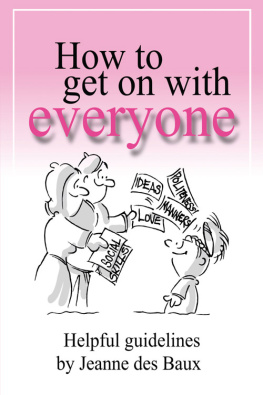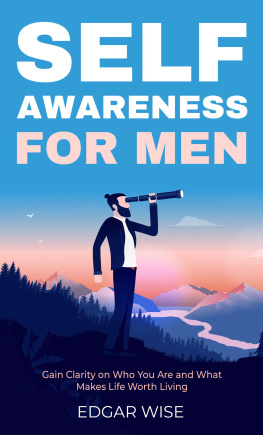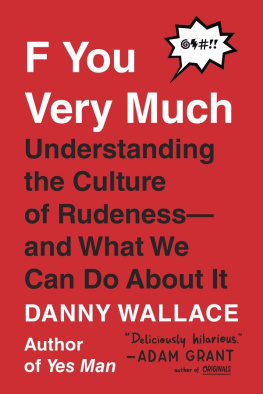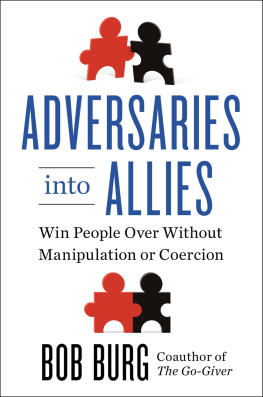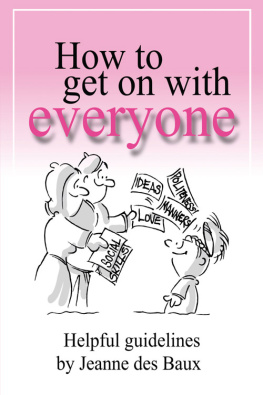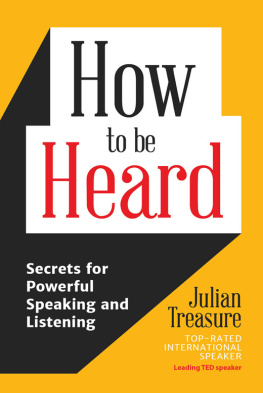
Content


WHY DO WE NEED TO GET ON WITH EVERYONE?

Everyone starts life with an empty sheet and then, like a computer, we are gradually down loaded. If we are very lucky we will have had socially competent, loving parents with good personal skills and we will grow up finding social skills relatively easy though we may still have some gaps to fill. If we are not so lucky we will need to work harder to fill the missing pieces and plug lots of gaps. Fortunately all these skills can be learnt. With a little time and patience we can become highly functioning people with excellent personal skills.
Nearly everything in life we do requires us to get on with other people, from earning a living, to buying our food and necessities to our private life with friends, family and loved ones. Whatever we do in our lives requires us to talk to and be with other people.
As we have to have these relationships the better we can handle them the smoother and easier our lives will be.
People who have good interpersonal skills have an easier passage through life with more opportunities presenting themselves with better contacts and more friends. More people will be inclined to help them. This relates to business, private and personal lives. There is no area that will not be affected. They will be easier to deal with, less confrontational and if problems do arise they will be more easily solved.
This book is not intended to give all the answers but general guidelines which should be helpful. Some things you will know and others may be new to you.
SELF AWARENESS

Know thyself
- Socrates
Self-awareness recognising a feeling as it happens is the keystone to emotional intelligence.
- Daniel Goleman
Emotional Intelligence
One of the first things to do in our quest to get on with other people is to become very self aware. The more we are aware of ourselves the less likely we are to make any social blunders and the more compassion and understanding we will be capable of having for others.
To become self aware we need to monitor
1. our own motives,
2. thoughts,
3. feelings and
4. actions.
If we monitor our thoughts we will understand our own motives and reactions to others. If we monitor our feelings we will know what makes us feel happy, sad, angry etc. Each time we understand ourselves a little more we will be able to understand others better. When we understand our own actions and reactions and why they have occurred, we are well on the way to becoming much more empathetic.
To become more self aware takes time and a little application but the rewards are enormous.
Questions to ask ourselves regularly are
1. How do I feel?
2. Why do I feel this way?
3. Could I have handled the last situation/date/meeting/conversation better?
4. Would I feel differently motivated now, would I feel better/worse, would the results be better/worse.
5. How is the person/people involved likely to feel towards me now?
You do not want to become over anxious about the other people but to be aware of how the other people are likely to feel and react. The ideal is to always do the best we can in any situation and produce the best possible results. If things do not turn out the way you planned you will have the satisfaction of knowing you have done your best and everything possible.
Persistence here will pay large dividends; you will improve all your relationships and your life generally.
You need to become aware of how you impact on other people and try to notice the following;
1. Are the things you are saying or doing having the expected or wanted effect on the other people/person you are with?
2. What reaction are you producing in other people, is there something you need to improve?
3. When you are speaking to people are they fully engaged with you? Does their attention stay focussed or drift off? Are they happy to continue the conversation or do they bring it to an end?
Be kind to yourself and accept that you will not do things perfectly all the time. If you do you will soon find yourself being more accepting of faults in others.
Do you have goals? Do you have business, financial, social or personal goals and how do they affect your behaviour? How do you perceive these in other people?
What values do you have? Do you believe in total honesty, good manners reliability and good behaviour? Do your beliefs waiver a little lower? These will definitely affect your behaviour and other peoples reactions to you and their perception of you. Do you judge other people on their values?
Does your behaviour mirror your beliefs; always, usually, sometimes or rarely. Just monitor your thoughts, feelings and actions and gradually you will become far more self-aware.
The more self aware you are the better your interpersonal skills will become.

LISTENING SKILLS

When people talk, listen and listen completely. Most people never listen.
- Ernest Hemingway
I like the fact that listen is an anagram of silent .
- Alfred Brendel
Listening is one of the most underrated skills and one that is most generally lacking. Listening means hearing, and it means focussing on the person and hearing the whole message and also being aware of the feelings behind it.
All of this may sound very simple but it requires practise and concentration.
The following points are worth remembering
YOU ARE NOT LISTENING TO ME IF
You say you understand before you have heard me out. You cut me off before I have finished speaking
You finish my sentences for me
You want to tell me something else
You make my experience unimportant by telling me your own
You are critical of me in some way
You are not giving me your full attention.
YOU ARE LISTENING TO ME IF
You really try to understand even if I am not making much sense
You grasp my point even when it is different to your own
You let me make my own decisions even though they might be wrong
You let me deal with my problem in my own way
You do not give me good advice
You accept my thanks gracefully
Listening skills can have an amazing effect on people. Several times I have been told I was an amazing conversationalist and very good to be with simply because I have listened carefully to someone. On each occasion I had certainly had done very little talking.
Do remember eye contact and body language. You need to face the person concerned with uncrossed arms and legs and preferably leaning slightly forward.
Try to make these skills a part of your life and not just something you keep up for a few days.
Next page
